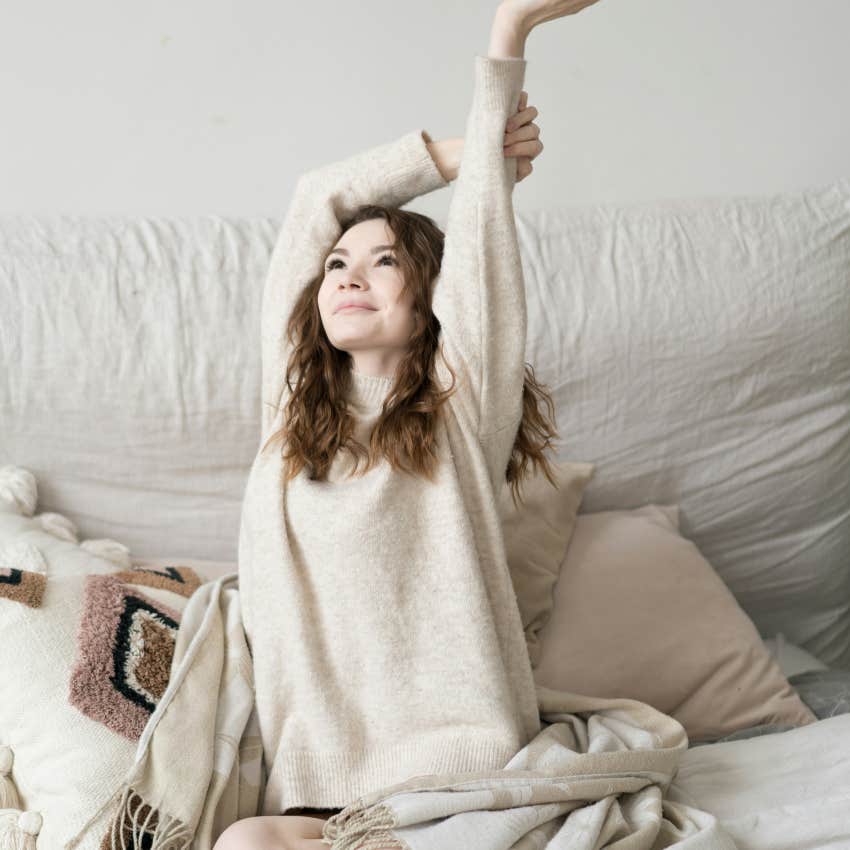3 Habits Of People Who Protect Their Peace That Stressed-Out Folks Always Overlook
To achieve happiness, it turns out you don't have to look too far.
 artyme83 | Shutterstock
artyme83 | Shutterstock Teenagers and young adults are riddled with negative stereotypes concerning mental health: pessimistic, unconcerned, sluggish, and self-absorbed. Those feelings indeed fester through external problems they have less control over, like family, career prospects, the state of the world, and the future, but it's naive to write them off as one thing when happiness lives through them in varying degrees.
According to a 2025 national Poll by Hopelab and Data for Progress, 61% of Gen Z self-identified as "somewhat" or "very" happy. These numbers might be surprising to most, considering the general consensus has been that Gen Z struggles greatly when it comes to finding peace among the chaos of everything from politics to social media.
This embracement of contentment shows a realistic grasp of young people's emotions, mental health, and subsequent coping practices to alleviate the stressors that do come about. Adopting sustainable habits reinforces the standards young people have for themselves, which stressed-out individuals can learn from.
3 habits of people who protect their peace that stressed-out folks always overlook:
1. Having solo downtime
 Impact Photographyi | Shutterstock
Impact Photographyi | Shutterstock
Although habits take added effort to integrate and enforce in your day-to-day, having a routine establishes a dependable foundation for your mental health to thrive in. Finding the activities and constants that propel you to start your day and the little things that motivate you to keep going is the goal. Luckily for young people, they are becoming masters of their stories, prioritizing their well-being the most.
87% of poll respondents confidently said they prioritize alone time. It's integral in understanding yourself and what makes you comfortable in your skin. Alone time is often when new hobbies and interests are formed, when new ideas take shape, and when indulgence in favorite activities can be done without anyone looming over your shoulder. It's indulgent in the best ways possible.
Kendra Cherry, MSEd, a psychosocial rehabilitation specialist, agrees with the findings and explained that alone time can be a way to "explore new things, research topics that interest you, gain knowledge, and even practice new forms of self-expression." She went on to say, "Taking some time for yourself allows you to explore these aspects free from the pressures and judgments of others. Having time to yourself is critical for growth and personal development. Instead of worrying about the needs, interests, and opinions that others may have, alone time lets you focus on yourself."
It's refreshing to see data on paper activate in the real world. Riding the Subway in New York, I observed handfuls of people in every car carrying a book with them with a bookmark in the middle of its binding, surfing YouTube to listen to Harry Styles' lyric videos, clearing the middle of the train car so they could breakdance, or even taking a nap. Peaceful and keeping to themselves, their bubble is stationed in their person.
The gaps in between socialization at school, home, work, or any public space are not used as filler space; rather, they're times that convey interest and meaning to these people. Enjoyment of the self through self-reliance and independence keeps the soul at peace.
2. Prioritizing face-to-face-friend time
 Dominic Sansotta | Unsplash
Dominic Sansotta | Unsplash
In between solo downtime and all the other obligations of a busy life, people who protect their peace always make it a point to carve out face-to-face time with their nearest and dearest. It's a priority that many miserable folks overlook.
According to the poll, 85% of respondents agreed that spending time with their friends in person was necessary to their overall well-being, and a whopping 43% said that it helps "a lot" when it comes to mental health.
A balance between sweet escapes from the rest of the world needs to be paired with a tethered social life. Quality time spent with friends strengthens our mental health. The American Psychological Association found that "self-disclosure between friends — sharing thoughts and feelings — helps young adults build empathy for others, practice seeking and providing social support, and even solidify their identities." Finding your community creates a support system that should cheer you on in pursuit of your goals and reassure you in the validity and navigation through life.
Real connection requires more than just texts and phone calls. To truly reap this benefit, it's necessary to be held and comforted at points of achievement, rock bottom, and everything in between. It's reassuring to pick up the phone and have your best friend come to you at a moment's notice.
3. Getting enough sleep
 Erinada Valpurgieva | Unsplash
Erinada Valpurgieva | Unsplash
Perhaps the most practical of the habits found among people who understand how to protect their peace is a healthy sleep schedule. It's easy to get caught up in daily stressors, and attempting to increase downtime by putting off sleep is common. Unfortunately, it doesn't work.
Eighty-three percent of poll respondents noted that sleep was integral to their overall sense of happiness and peace. Among those, 40% asserted that it helped their mental health "a lot." It's not hard to guess why. “Just like our electronics need to be charged, sleep may recharge or reset the brain to optimize functioning,” explained Elizabeth Blake Zakarin, an assistant professor of psychology (in Psychiatry) and a clinical psychologist at the Columbia University Clinic for Anxiety and Related Disorders.
She went on to detail that "sleep is critical to not only our physical health but also our mental health. Poor or insufficient sleep has been found to increase negative emotional responses to stressors and to decrease positive emotions." She added that that's exactly why we feel so wonderful after a "good night's sleep." Whereas bad sleep or a restless night leaves us "grumpy," and "foggy."
Finding peace in the midst of a chaotic life isn't by chance, and the respondents to this poll proved that. In order to live the life you want, you have to take steps to achieve happiness and positive well-being. Integrating these habits is a good place to start. Change is a constant, but habits formed with intention make peace much more accessible.
Emi Magaña is a writer from Los Angeles with a bachelor's in English. She covers entertainment, news, and the real human experience. More of her non-fiction essays appear in CHAPSTICK online magazine and on her Substack.

